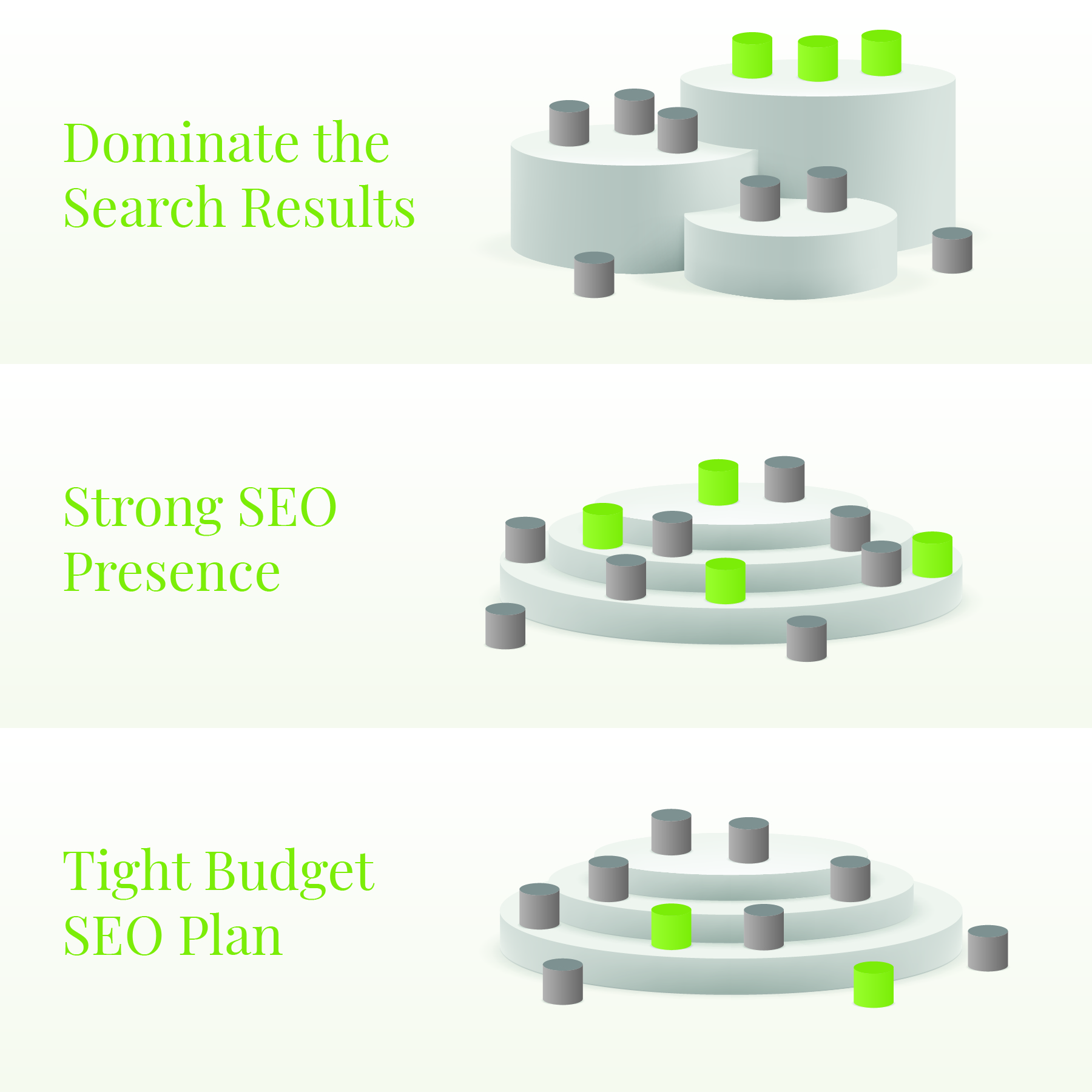Digital Marketing, SEO

When we talk about our clients’ SEO goals, we get fairly consistent answers:
- I want my law firm to rank higher.
- I want to outrank my competitors.
- I need more traffic to my website.
- I want more cases from online advertising.
These answers provide a great start, but we often need to spend more time fine-tuning your goals before jumping into an SEO strategy. You wouldn’t go to a print design agency and simply say, “I want you to design an ad.” You’d probably have an idea of where the ad should go and what you want to convey. Also, designing a billboard and a magazine ad are very different things.
For SEO to be successful, you need to dig deeper and establish more refined goals. “I want to be on the first page of Google” can mean different things to different people, and it leaves a lot open to interpretation.
We develop SEO strategies as unique as the law firms themselves. For example, a medium-sized personal injury practice in one market may be able to increase its local presence with some basic SEO link building. But a similar firm in a different market may need link building and other SEO practices like on-page optimization to get the same result. While your SEO needs are unique, we often see three approaches to SEO for law firms.
- Dominate search.
You want to be in the top search position for highly competitive keywords related to your practice. - A strong SEO presence. You don’t need to be #1 for everything but should be among the top-ranking law firms, with a focus on a few high priority practice areas.
- SEO on a Budget. You’d like the bare minimum SEO work required to see results, but you’re not ready to make a more substantial investment yet.
These all require a different level of investment, and the SEO strategy for each scenario will have its own considerations. Let’s break down each strategy so you can see which bucket your law practice may fall into.
Dominate Search
Overview
Law firms who want to dominate search results are generally more established and want to take their strategy to the next level. They’ve seen the value in Yelp, Facebook, and Avvo listings and are comfortable making the investment in a comprehensive SEO strategy.
Goals
This strategy is meant to maximize traffic to your law firm’s website through establishing high rankings for commonly-searched keywords related to your practice area. While this is achieved through increasing your presence in search engines, we advise against using your position within Google as the primary goal. For example, a goal of ranking in the first 3 positions for keywords like “personal injury lawyer” is a means to an end, rather than the end itself.
Goals should be closely tied to your business. For example, you may want to increase your firm’s new cases by a certain percentage.
Considerations
1. Your website must be top-notch.
When you want to own search results, you can’t do SEO in isolation. Your rankings are a factor of many things, like your law firm’s website design and your content strategy. You’ll need to build a robust SEO program if you want to be a top-ranking law firm.
This also means having a well designed mobile-friendly website. Your content should be optimized for SEO, and you’ll need to perform ongoing updates to your website.
2. Achieving #1 rankings will take some time.
You can’t go from 0 to 60 with SEO. Depending on where you are currently ranking and the state of your firm’s website, establishing a dominant presence is going to take some time. If you’re not currently on page 1 for the keywords you care about, it can take a year or even longer, depending on how competitive your market is.
A strong SEO strategy involves gradual, positive growth in your rankings, traffic and new cases to your firm. You can’t expect to double your caseload from SEO in just a month or two, so it’s important to make sure you’re generating cases from other marketing efforts while your SEO strategy execution ramps up.
3. It’s an investment.
Law firm SEO is very competitive, especially in practice areas like personal injury, criminal law/DUI defense, and family law. If your goal is to be the best, you’ll have to invest more time and resources into your SEO efforts than the competition. This investment will also need to include multiple office locations or if you’re located in a major metro with more competing firms.
4. General practice firms face some challenges.
When it comes to search rankings, Google’s algorithm is designed to provide the most relevant results. Let’s say you are a general practice law firm looking to establish rankings across several practice areas – from personal injury to family law. You’ll likely be competing with highly-specialized law firms who focus all of their digital efforts in one niche.
It’s not impossible for a general practice firm to outrank a more specialized firm. But you may have to work a little harder to establish the Expertise, Authority, and Trust (E-A-T) Google requires for a top-position.
5. Put effort into PR and other digital marketing channels.
With digital marketing for attorneys, all boats typically rise together. When you see a law firm consistently ranking #1 in Google, it’s generally a firm you recognize. This is no coincidence. If you focus on increasing your firm’s presence in your community, you’re more likely to reap the benefits of your SEO efforts.
People are more likely to click on a search result if they recognize the name. Stay involved in your local community, encourage clients to leave positive Avvo, Google, or Yelp reviews, and look for opportunities to display your thought leadership, whether it’s through speaking at events or being a source for local news outlets. The more familiar your law firm’s brand becomes, the stronger your SEO results will be.
A Strong SEO Presence
Overview
This is the “sweet spot” of law firm SEO that can work well for many attorneys. This strategy is for lawyers who want to see a measurable impact from their SEO efforts, but they want to focus their efforts on a few high-priority areas. For example, a criminal defense firm may want to establish a stronger organic search presence for DUI-defense and traffic offenses. A personal injury lawyer may want to focus on car and truck accidents.
Goals
This approach is more focused on your high-priority areas. There are likely a small group of law firms that consistently rank on page 1 of Google for certain practice areas, and your goal is to be among them. You want to establish a comparable presence in search results, but not overinvest so you can keep your marketing budget reasonable.
Be sure to set a realistic goal of increasing new cases for the practice areas you prioritize.
Considerations
1. Your priorities should be the things you’re most well-known for.
When you prioritize which areas you’re going to focus your SEO efforts, it should be consistent with the types of cases you are most well-known for or equipped to handle. Think about what differentiates your firm from the competition. Perhaps you have an attorney with much more experience in a particular area of law. This is something your SEO team can use to your advantage when they’re creating your strategy.
It’s also important to understand the potential for growth. An SEO strategy is strongest when it’s based around a clear demand that people are searching for. If your high-priority practice areas are very niche, you may not see as much growth as a more common type of case. For example, a personal injury attorney focusing on construction-related work injuries will not see as much of an increase, compared to more general work injuries.
2. The amount of time reflects the competitive market.
Even if you’re not trying to be the #1 website, it can still take several months to get your website onto page 1. The time and effort it takes will be largely dictated by how competitive the practice areas are.
3. You’ll still need maintenance on the rest of your website.
Even if you’re focusing on a few practice areas as a higher priority, it doesn’t mean you can ignore the rest of your law firm’s website. You still need to list all of your practice areas, and the content on each webpage should be well-written and align with SEO best practices.
Google’s crawlers will evaluate your entire website, so it’s important that every page is well-written with the necessary SEO elements. You’ll just put more effort into the areas you want to establish stronger organic rankings in.
4. Your SEO strategy can grow with your firm.
An SEO strategy can and should evolve as your law firm grows and priorities change. Let’s say you’ve established good rankings for a practice area and you’re happy with the amount of cases generated each month from SEO. While you still need to spend time each month maintaining your rankings, you may want to start focusing on another practice area to increase your caseload. You could also shift your marketing budget to test new digital channels like PPC or paid social media advertising.
SEO on a Budget
Overview
Sometimes, attorneys are just looking to do the minimum, and that can be ok. Their priority is just finding the most affordable rate for SEO services. You should always be realistic about your marketing budget and what your law firm can afford to spend. However, your marketing strategy is a key business-driver, and you’ll sacrifice quality if you’re simply looking for the cheapest option.
Goals
There really is no such thing as doing “a little bit of SEO.” The fact is that Google’s algorithm is designed to reward websites that put time and effort into providing the best experience to their visitors. For law firms with a very tight marketing budget, this presents challenges.
Your goal should be to invest in as much SEO work that you need to deliver measurable results. How many new cases would you need to receive in order to make investing in SEO make sense? Your marketing agency should be able to help you understand how to achieve this, and they should be honest about what’s feasible within your budget.
Considerations
1. Cheap SEO can cost more in the long run.
We see this all the time. SEO agencies who offer their services for a few hundred dollars are often the ones who engage in spammy tactics that may lead your website to receive a penalty, which gets your site suspended or dropped from search results.
When this happens, it often requires hiring someone to fix the issues. In many cases, it means starting over with a new domain for your law firm. Fixing SEO mistakes is more time-consuming than if you were to start from scratch, so you’ll end up investing more in the long run.
2. You need to invest at a certain threshold.
You don’t need to hire someone to work for 40 hours per week exclusively on SEO for your website. But, you also can’t expect results from a one-time SEO project that takes a day to complete.
For your investment to lead to new cases, you simply must be on page 1 of Google for at least a handful of keywords that have significant enough search demand. Not everyone who visits your website will turn into a client, so you may need to increase traffic by 50 visits per month to bring in one or two cases.
An SEO professional will be able to assess the competitive landscape and give you a realistic idea of how much effort your website needs to drive enough business so your investment is worth it.
3. Yes, you need ongoing maintenance.
SEO is not a one-time investment. Google’s algorithm and behavior is always changing. Your competitors are working to improve their rankings. You need to do the same by continuously evaluating your SEO strategy and optimizing your website. You’ll also need to continue looking for opportunities to increase your website’s backlinks.
At a minimum, you need at least a few hours of ongoing monthly maintenance. If you do some SEO work and then neglect your website for months, you’ll likely see your rankings decrease and be out-ranked by legal websites that continuously update their content and prioritize ongoing SEO.
4. You’ll need to set realistic expectations.
If your strategy is to invest just enough in SEO, you can’t expect to rank #1. You may only get a few cases a month from your efforts, and your website may only rank on page 1 for a handful of keywords. If you’re doing ongoing maintenance, you should see your business increase, but it will be a slow process. It’s important to understand you’re not going to dominate search results if you’re not putting maximum effort into your SEO program.
5. There may be better investments.
Everyone likes the idea of SEO. A common misconception is that it’s “free traffic.” And while you don’t pay for your placement in organic results, it still requires a substantial investment in talent and time. You have to be willing to commit to something that will not generate business results right away, which can be difficult for smaller firms with smaller budgets.
It’s also a good idea to take a step back and evaluate all of your firm’s expenses. How does your marketing budget fit in with things like office space rental, benefits, technology, and equipment? You should speak with a business consultant who can help you understand what your firm can really afford to spend on marketing and help you spot areas of your business where you may be overspending or underinvesting.
At Postali, we know what SEO tactics work for lawyers and how to apply them the right way. If you want to discuss your SEO goals and what makes sense for your firm, we’d love to talk.

Not sure where to begin?
Get started with a marketing audit.

